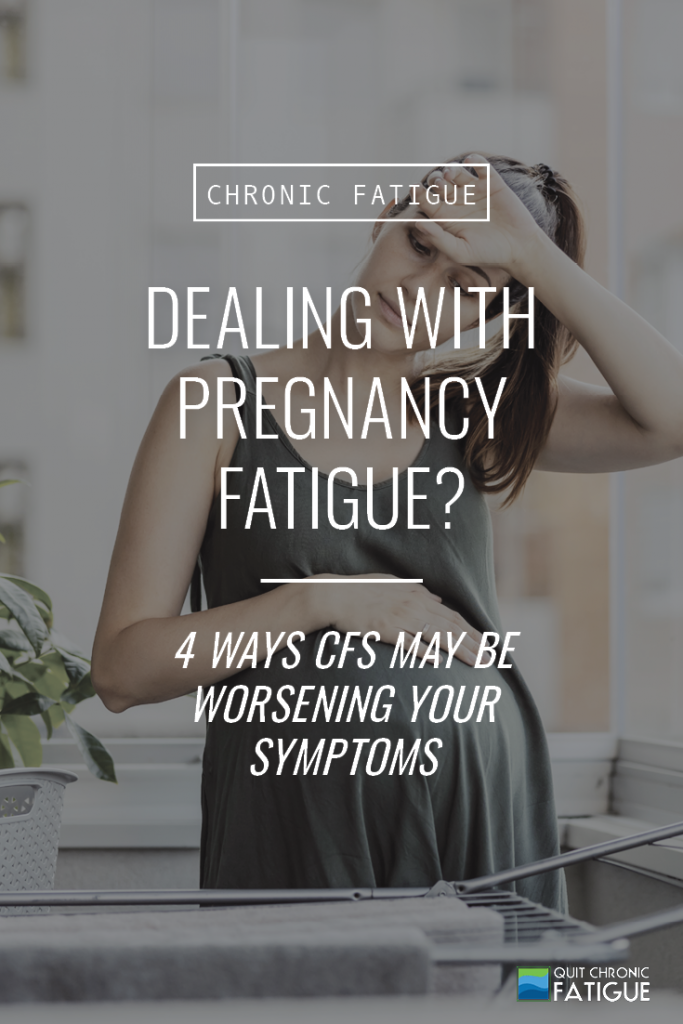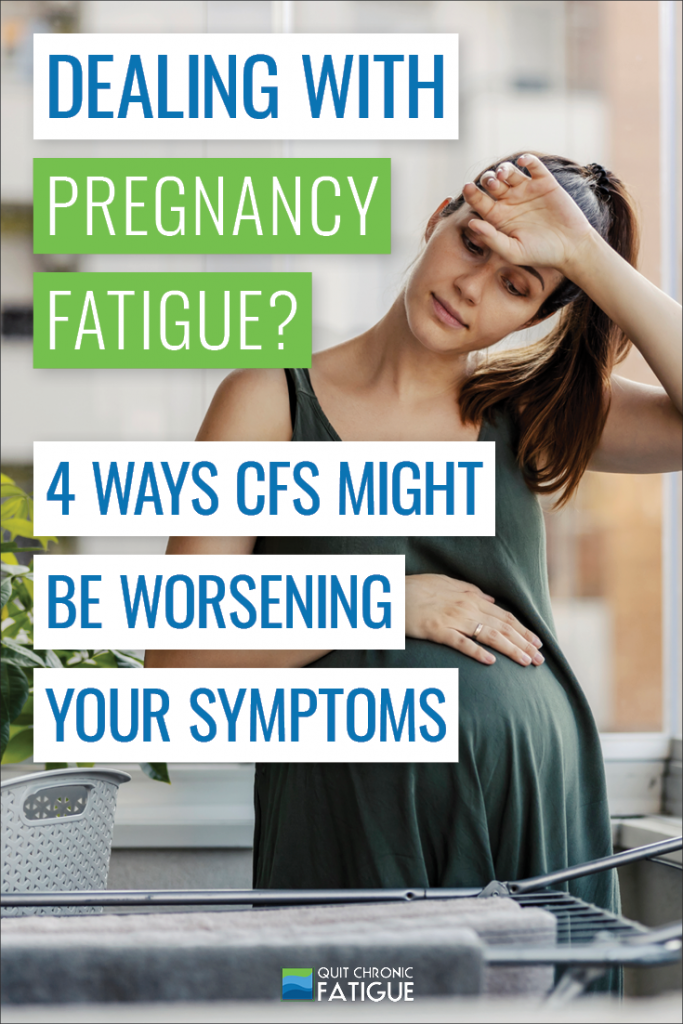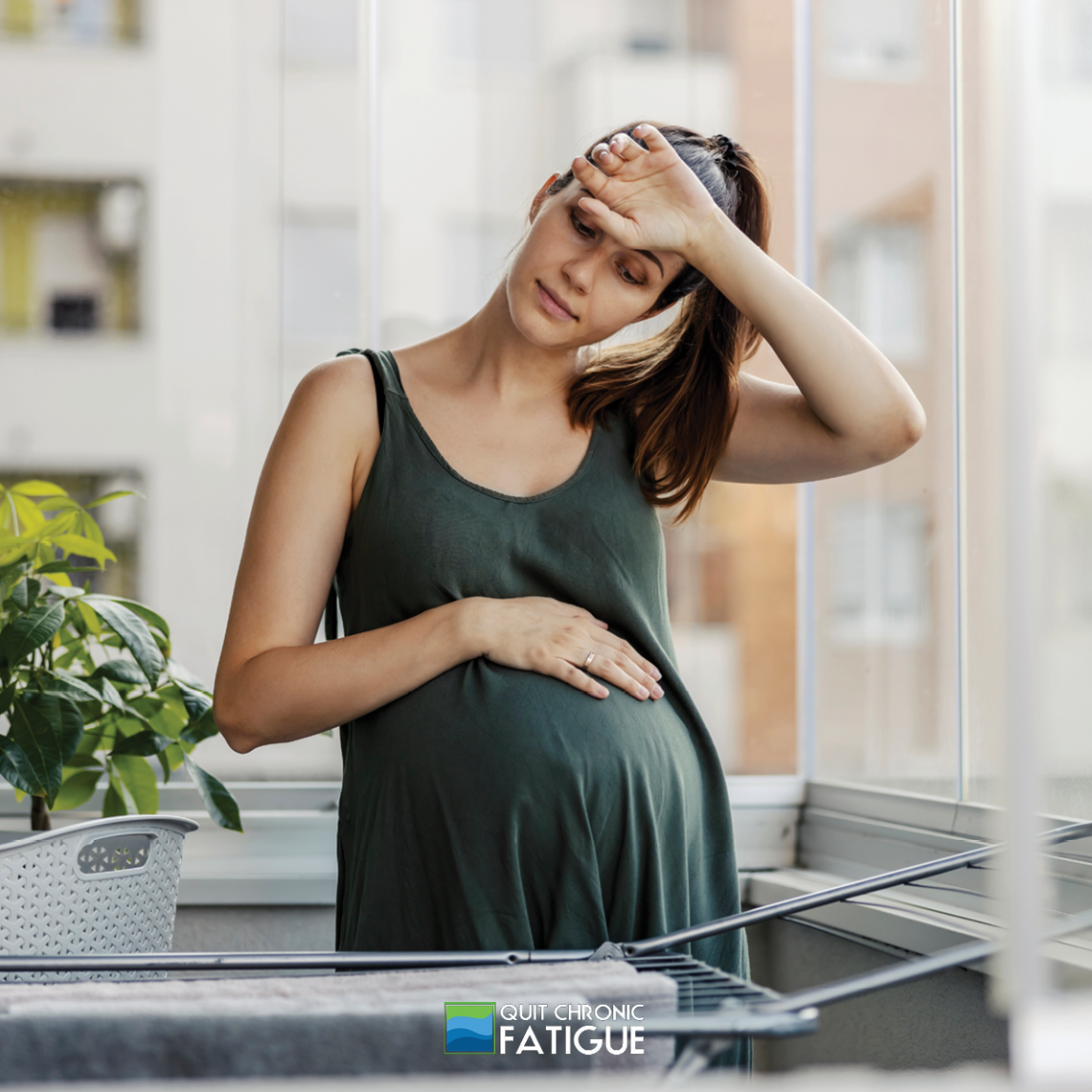If you are pregnant or have been pregnant, you’ve definitely felt pregnancy fatigue. It’s one of the most common symptoms of pregnancy, leaving expectant mothers sleepy at all times of the day. But for moms with Chronic Fatigue Syndrome, there’s more to pregnancy fatigue than just tiredness.

What Is Pregnancy Fatigue?
Pregnancy fatigue is one of the earliest signs of pregnancy. As soon as you conceive, pregnancy hormones start flooding your bloodstream, causing you to feel more and more tired as the weeks go on. Estrogen and progesterone levels increase when you’re pregnant, the latter of which actually acts as a sedative.
Pregnancy fatigue is intense and draining. But you’re growing a baby. It’s no wonder you’re exhausted! The fatigue will be the most extreme in the first and third trimesters, but you’ll likely feel a burst of energy during your second trimester.
When you’re pregnant, you may experience a range of symptoms, all of which can disrupt your energy levels and leave you exhausted. Frequent urination, digestive issues, heartburn, anxiety, and back or pelvic pain all interrupt your sleep and make the shuteye you do get less restful and restorative.
Related: How To Make Parenting With Chronic Fatigue Easier (and More Fun)
Are You Feeling Pregnancy Fatigue or CFS?
If your pregnancy fatigue is feeling pretty extreme, you may be worried that you’re actually experiencing Chronic Fatigue Syndrome. Many expectant mothers fret over their tiredness levels, but there’s an easy way to figure out what you’re truly experiencing.
If the fatigue began suddenly (right around the time you think you conceived) and disappeared or improved during the second trimester, you’re likely just dealing with pregnancy fatigue. Also, take into account your ability to do your usual tasks and errands from pre-pregnancy. CFS is characterized by a seriously lowered ability to do normal daily duties (like grocery shopping, cleaning, or showering) once the illness hits. If you’re feeling strong and capable outside of your fatigue, you’re likely CFS-free.
How CFS Can Worsen Pregnancy Fatigue and Other Pregnancy Symptoms
If you do have CFS, though, you’ll likely feel its effects throughout your pregnancy. It can seriously worsen your pregnancy fatigue and impact the severity of your other symptoms. Read on for four major ways CFS might be making your pregnancy tougher.
CFS May Lead to Hyperemesis Gravidarium
Morning sickness is an incredibly common side effect of pregnancy, especially in the first trimester. But moms with CFS have a greater chance of experiencing hyperemesis gravidarum: “morning” sickness that lasts all day, all pregnancy long.
Hyperemesis gravidarium can leave you drained and dehydrated, which doesn’t help your CFS or pregnancy fatigue. If your morning sickness is more intense than expected, chat with your doctor about pregnancy-safe antiemetics to get you back on track.
Related: How to Improve Your Gut Health During Pregnancy and After Birth
The First and Third Trimesters Might Be Extra-Difficult
The first and third trimesters are pregnancy fatigue hotspots for all expectant mothers. But when you compare stories with your mom friends, those with CFS will likely remember both trimesters as incredibly difficult from intense fatigue.
You may need more prenatal care during your first trimester if you have CFS. Beyond extreme fatigue and morning sickness, moms with CFS have a higher risk of miscarriage during these 13 weeks. And the third trimester may weigh on your body more than normal with intense heartburn and difficulty moving around or catching your breath.
CFS Can Make Pregnancy Mood Swings More Intense
Pregnancy comes with mood swings and so does Chronic Fatigue Syndrome…put them together and your emotions may feel far more intense than normal. In this case, the stereotype of overly-emotional, constantly-crying moms rings true. But pregnancy hormones may not be the only things to blame, unlike many moms believe.
Expectant mothers with CFS can experience feelings of depression during pregnancy and often feel dejected or detached from their surroundings. The tiredness from CFS and pregnancy fatigue can leave you feeling even lower, making it difficult to overcome. And that puts you at a greater risk of postpartum depression, too.
CFS May Impact Your Labor & Delivery
When you have CFS, you’ll feel pregnancy fatigue from conception all the way up until labor and delivery. Think about it: your already-fatigued body has been working overtime creating a life for the past 9 months. Of course, you’re exhausted by the time you’re in labor!
If you have Chronic Fatigue Syndrome, be sure to let your midwives and nurses know when you’re in the delivery room. You may tire out quicker than other moms during labor and require more breaks to rest before you get back to pushing. You’ll likely have a longer recovery period after you deliver, too, so make sure your partner is prepared to take care of you and your newborn.
Pregnancy fatigue can feel overwhelming for any mother, but mothers with Chronic Fatigue Syndrome have much more to worry about than just tiredness. If you deal with CFS, make sure you talk to your doctor about your pregnancy symptoms, especially if they’re more intense than expected. Take care of yourself to put mom and baby first.




